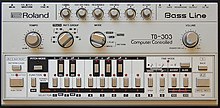TB-303
| Roland TB-303 Bass Line | |
|---|---|

TB-303 front panel
|
|
| Manufacturer | Roland |
| Dates | 1981-1984 |
| Price | £238 UK, $395 US |
| Technical specifications | |
| Polyphony | monophonic |
| Timbrality | monotimbral |
| Oscillator | Sawtooth and square wave |
| LFO | none |
| Synthesis type | Analog Subtractive |
| Filter | 18dB low pass resonant filter, non self oscillating |
| Aftertouch expression | No |
| Velocity expression | No |
| Storage memory | 64 patterns, 7 songs, 1 track |
| Effects | No internal effects. |
| Input/output | |
| Keyboard | No |
The Roland TB-303 Bass Line is a bass synthesizer with built-in sequencer manufactured by the Roland Corporation from 1981 to 1984 that had a defining role in the development of contemporary electronic dance music.
The TB-303 played an important role in the development of house music, influencing Chicago house and forming the basis for acid house. It is also commonly used in related dance genres such as acid techno and acid trance.
The TB-303 (short for "Transistor Bass") was originally marketed to guitarists for bass accompaniment while practicing alone. Production lasted approximately 18 months, resulting in only 10,000 units.
The TB-303 has a single audio oscillator, which may be configured to produce either a sawtooth wave or a square wave. The square wave is derived from the sawtooth waveform using a simple, single-transistor waveshaping circuit. This produces a sound that is subtly different from the square waveform created by the dedicated hardware found in most analog synthesizers. It also includes a simple envelope generator, with a decay control only. A lowpass filter is also included, with -24dB per octave attenuation, and controls for cutoff frequency, resonance, and envelope modulation parameters. It is a common misconception that the filter is a 3 pole 18 dB per octave design when in fact it is 4-pole 24 dB per octave.
...
Wikipedia
